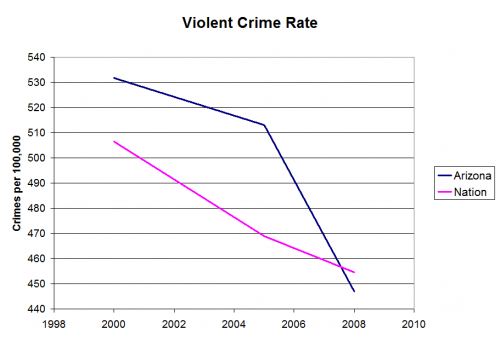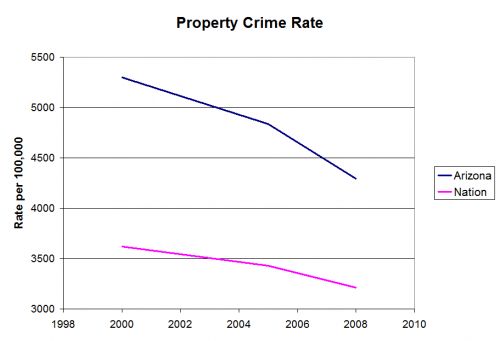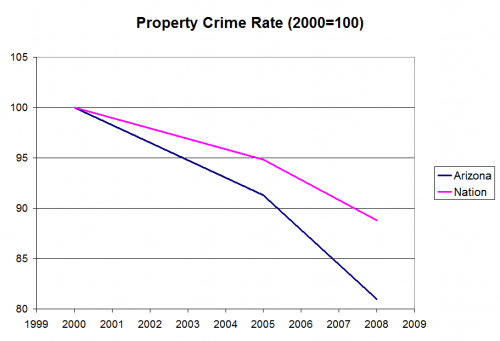Al Gore Meets Movie Gore: Climate Alarmism Jumps the Bandersnatch
I suppose one cold say that climate alarmism jumped the shark years ago. But they have certainly moved to a new level, one for which there is not even a term, in this video. This video has everything - the government school teacher politically indoctrinating the kids, followed by bloody gory death dealt out to the kids who refuse to toe the government line. I am not kidding.
When I first saw it, I was sure it was a skeptic satire, ala Jonathon Swift's 'A Modest Proposal,' and I am still afraid that this may be some elaborate put-on because the video and its message -- that skeptics need to be killed -- is so obscene. But apparently, according to this article at the Guardian, it is totally for real and includes contributions from some fairly prominent artists, as well as funding from the UK government and the 10:10 program (a plea to reduce carbon emissions by 10% per year, eerily with a name probably purposely similar to 9-11).
Our friends at the 10:10 climate change campaign have given us the scoop on this highly explosive short film, written by Britain's top comedy screenwriter Richard Curtis, ahead of its general release....
Had a look? Well, I'm certain you'll agree that detonating school kids, footballers and movie stars into gory pulp for ignoring their carbon footprints is attention-grabbing. It's also got a decent sprinkling of stardust "“ Peter Crouch, Gillian Anderson, Radiohead and others. But it's pretty edgy, given 10:10's aim of asking people, businesses and organisations to take positive action against global warming by cutting their greenhouse gas emissions by 10% in a year, and thereby pressuring governments to act.
"Doing nothing about climate change is still a fairly common affliction, even in this day and age. What to do with those people, who are together threatening everybody's existence on this planet? Clearly we don't really think they should be blown up, that's just a joke for the mini-movie, but maybe a little amputating would be a good place to start?" jokes 10:10 founder and Age of Stupid film maker Franny Armstrong.
But why take such a risk of upsetting or alienating people, I ask her: "Because we have got about four years to stabilise global emissions and we are not anywhere near doing that. All our lives are at threat and if that's not worth jumping up and down about, I don't know what is."
The latter claim is hilarious. Over the next four years, CO2 levels will likely increase, if they stay on trend, from .0392% of the atmosphere to .0400% of the atmosphere. I would love to see these so-called science-based folks demonstrate how the next .0008% shift in atmospheric concentration triggers the point-of-no return tipping point. In actual fact, the have just latched onto the round number of 400ppm and declared, absolutely without evidence, that this number (which the Earth has crossed many times in the past) will somehow lead to a runaway chain reaction.
Anyway, I have teased it long enough, here is the video. Beware -- there is gore (no pun intended) here worthy of a zombie movie.
Wow, its sure good that the world has decided that skeptics are the mindless, thuggish, anti-science side of this debate, because if that had not already been made clear, we might think that key climate alarmism groups had lost their freaking minds. It will be interesting to see if this gets any play in the US media -- my guess is it will not. Magazines are happy to spend twenty pages dissecting the motives of the Koch family in funding skeptic and libertarian causes, but environmentalists get a free pass, even with stuff like this.
Lubos Motl is all over this, and has mirror sites for the video if (or more likely when) the video gets taken down. This is one of those propaganda offers that are the product of an echo chamber, with a group of like-minded people all patting themselves on the back only to be surprised at the inevitable public backlash.
I have mirrored the video here in case it gets a youtube takedown.
Update: As a reminder, this is not satire. It is made by a group of true believers. It was funded and approved and released by a climate alarmism group, which paid top dollar (including UK taxpayer funds) for a large professional team of actors, writers, and directors. All interviewed participants, including the first little actor blown up, have stated how proud they were of the film and its contribution to educating people on the need for immediate action on global warming.
For the last hour, I have sat and tried to think if, as a skeptic, I had wanted to make a satire critiquing the excesses of global warming alarmism, could I have made a better video. The only thing that might have made it better would have been if the final button-pusher was someone famous like James Cameron or Bono, who after then pushed the button climbed on their Gulfstream jet to fly home. But that's just a quibble. I have changed my opinion. This may be the greatest skeptic video ever, and the Koch family didn't even have to pay a dime for it. Thanks 10:10.
Update #2: This movie reminds me of nothing so much as Tarantino's Inglorious Bastards. It is clearly not reality, but the author's fantasy. Tarantino fantasizes about a group of jews kicking ass on the Nazi high command and ending the war early. 10:10 fantasizes about blowing up skeptics, in a video that, amazingly, is more blood-spattered than Tarantino's.
Update #3: The group pulls the video with a classic "I'm sorry you guys are so easily offended" apology.
Update #4: Unsurprisingly, Joe Romm (in the italics in this post) goes to the kindergarten argument of "he started it," arguing that the video is just the flip side of the stuff skeptics are doing all the time. In making his pitch, he shows the mindset that allowed this stupid film to get made.
I am not sure exactly what comparable films skeptics have produced that are similar, and the only example he can cite is Anthony Watt's blog post comments on the shooting of an eco-terrorist. I did not even go back and look at Watt's comments, but I generally think that lots of people are too gleeful when suspected criminals, who are innocent before the law, are gunned down by police.
Never-the-less, its seems a stretch to equate the offhand comments in real time of an independent blogger with a film involving probably a hundred people (including those who commissioned it in the 10:10 organization), commissioned in an official and thoughtful act (after all this had to be months in the works), and funded in part by the British government. He takes the opportunity of his team's screw-up to launch this broadside on people like me (in bold no less).
None of this excuses that disgusting video. But the difference is that those who are trying to preserve a livable climate and hence the health and well-being of our children and billions of people this century quickly denounce the few offensive over-reaches of those who claim to share our goals "†but those trying to destroy a livable climate, well, for them lies and hate speech are the modus operandi, so such behavior is not only tolerated, but encouraged.
Is anyone else getting tired of this working definition that "hate speech" is any speech by people who disagree with me, because I have the best interest of humanity in mind so clearly those who oppose me hate the human race?
Note you can see this right in his statement -- "for those trying to destroy a livable climate." That's absurd. Does he really think anyone is trying to destroy a livable climate? I could say that through CO2 controls he is trying to impoverish billions of poor people in lesser developed countries by halting development, but I don't think that is really his motive. I think that is an outcome of what he advocates, just as he thinks an unlivable climate is an outcome of what I advocate, but I can distinguish between motives and assumptions, but he apparently cannot. This attitude is EXACTLY what causes this kind of unfortunate video to be made -- it is only a small step from believing, as he says he does, that skeptics are "trying to destroy a liveable climate" to making a movie that jokes about killing them all (or, to be frank, to feeling justified in acts of eco-terrorism).
I encourage you to watch my climate video and decide if folks like me are trying to thoughtfully decipher nature or are engaging in hate speech.
Update #5: Funny -- Gillian Anderson, actress from the 10:10 video, warning of Y2K dangers.
Update #6: I guess this was inevitable, but all the rats in the 10:10 ship are claiming that they had no idea what the video would be like and were appalled when they saw it. Right. An organization funds a major film production, including any number of high profile participants, and no one asked to see a script, screened the video before release, or even asked for some kind of written treatment of the concept? Yeah, right. No one in the 10:10 organization or who funded the video even peeked at it before it was released to the entire planet? This is so utterly lame but will probably be enough of a fig leaf for most of the media to hide behind and allow them not to follow up on a video whose basic premises they likely agree with.






